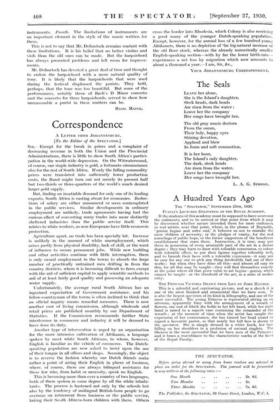Correspondence
A LETTER FROM JOHANNESBURG.
[To the Editor of the SPECTATOR.] SIR,—Except for the break in prices and a complaint of decreasing revenue in both the Union and the Provincial Administrations, there is little to show South Africa's partici- pation in the world-wide depression. On the Witwatersrand, of course, our staple industry is gold, a fortunate circumstance also for the rest of South Africa. If only the falling commodity prices were translated into sufficiently lower production costs, the Rand might turn out not merely its present half but two-thirds or three-quarters of the world's much desired larger gold supply.
But, finding an insatiable demand for only one of its leading exports, South Africa is casting about for economies. Reduc- tions of salary are either announced or seem contemplated in the public services. Similar developments in ordinary employment are unlikely, trade agreements having had the curious effect of converting many trades into more distinctly sheltered industries than the public service itself. This relates to white workers, as non-Europeans have little economic protection.
Agriculture apart, no trade has been specially hit. Increase is unlikely in the amount of white unemployment, which arises partly from physical disability, lack of skill, or the want of influence to secure permanent jobs. While new building and other activities continue with little interruption, there is only casual employment in the towns to absorb the large number of practically untrained men drifting in from the country districts, where it is becoming difficult to farm except with the aid of sufficient capital to apply scientific methods to soil of at least fairly good quality and possessing an adequate water supply.
Unfortunately, the average rural South African has an ingrained expectation of Government assistance, and his fellow-countryman of the towns is often inclined to think that an official inquiry means remedial measures. There is now another cost of living commission, although wholesale and retail prices arc published monthly by our Department of Statistics. If the Commission recommends further State interference in commerce and industry it will be deemed to have done its duty.
Another type of intervention is urged by an organization for the more intensive cultivation of Afrikaans, a language spoken by most white South Africans, to whom, however, English is familiar as the vehicle of commerce. The Dutch- speaking population are now asked to insist upon the use of their tongue in all offices and shops. Seemingly, the object is to reverse the fashion whereby our Dutch friends make rather a point of airing their English in places of business, where, of course, there are always bilingual assistants for those few who, from habit or necessity, speak no English.
This is becoming more than ever a country of two languages, both of them spoken in some degree by all the white inhabi- tants. The process is hastened not only by the schools but also by the tendency of unilingual British-born people to go overseas on retirement from business or the public service, taking their South African-born children with them. Others
cross the border into Rhodesia, which Colony is also receiving a good many of the younger Dutch-speaking population. Except, however, for the annual loss of a few hundred young Afrikaners, there is no depletion of the big natural increase of the old Boer stock, whereas the already numerically smaller English-speaking section—with by far the lower birth-rate— experiences a net loss by migration which now amounts to about a thousand a year.—I am, Sir, &c.,
YOUR JOHANNESBURG CORRESPONDENT.


































 Previous page
Previous page